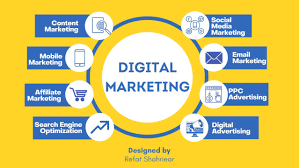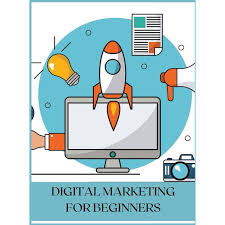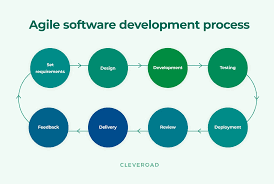The Power of Digital Marketing in Today’s Business World
In today’s fast-paced and technology-driven world, digital marketing has become an essential tool for businesses to reach their target audience effectively. With the rise of the internet and social media, traditional marketing strategies are no longer enough to compete in the market.
Digital marketing allows businesses to connect with their customers in real-time, engage with them on a more personal level, and track the performance of their campaigns with precision. Through various online channels such as social media, email, search engines, and websites, businesses can create targeted campaigns that resonate with their audience and drive results.
One of the key advantages of digital marketing is its ability to reach a global audience at a fraction of the cost compared to traditional marketing methods. With tools like Google Ads and Facebook Ads, businesses can target specific demographics, interests, and behaviors to ensure that their message reaches the right people at the right time.
Furthermore, digital marketing allows businesses to measure the success of their campaigns in real-time through analytics tools. This data-driven approach enables businesses to optimize their strategies based on performance metrics such as click-through rates, conversion rates, and return on investment.
Overall, digital marketing has revolutionized the way businesses promote their products and services in today’s competitive landscape. By leveraging online channels effectively, businesses can increase brand awareness, generate leads, drive sales, and ultimately achieve their business goals.
Essential Insights: Navigating the Digital Marketing Landscape – A Guide to Strategy, SEO, Social Media, and More
- What is digital marketing and why is it important?
- What are the key components of a successful digital marketing strategy?
- How can businesses use social media for digital marketing?
- What is search engine optimization (SEO) and how does it impact digital marketing?
- How does email marketing fit into a digital marketing strategy?
- What are the benefits of using pay-per-click (PPC) advertising in digital marketing?
- How can businesses measure the success of their digital marketing campaigns?
- What role does content marketing play in a digital marketing strategy?
- How can businesses stay updated with the latest trends in digital marketing?
What is digital marketing and why is it important?
Digital marketing refers to the use of online channels and tools to promote products or services to a target audience. It encompasses various strategies such as social media marketing, email marketing, search engine optimization (SEO), content marketing, and more. Digital marketing is crucial for businesses in today’s digital age because it allows them to reach a larger audience, engage with customers in real-time, track the performance of their campaigns accurately, and drive measurable results. By leveraging digital marketing effectively, businesses can increase brand awareness, generate leads, boost sales, and ultimately grow their bottom line in a competitive market landscape.
What are the key components of a successful digital marketing strategy?
A successful digital marketing strategy comprises several key components that work together to achieve the desired results. These components include defining clear objectives and goals, identifying the target audience, conducting thorough market research, selecting the most appropriate digital channels, creating engaging and relevant content, optimizing for search engines, utilizing social media effectively, implementing email marketing campaigns, analyzing data and metrics to measure performance, and continuously refining and adapting the strategy based on insights gained. By integrating these components into a cohesive plan, businesses can enhance their online presence, engage with their audience effectively, and drive meaningful results in today’s competitive digital landscape.
How can businesses use social media for digital marketing?
Businesses can leverage social media as a powerful tool for digital marketing by creating engaging content, building a strong online presence, and fostering direct interactions with their target audience. By utilizing platforms such as Facebook, Instagram, Twitter, and LinkedIn, businesses can share valuable information, promotions, and updates to attract and engage their followers. Social media also allows businesses to conduct targeted advertising campaigns to reach specific demographics and boost brand visibility. Additionally, businesses can monitor feedback and conversations on social media to gain insights into customer preferences and behavior, enabling them to tailor their marketing strategies for better results.
What is search engine optimization (SEO) and how does it impact digital marketing?
Search engine optimization (SEO) is a crucial component of digital marketing that focuses on improving a website’s visibility and ranking on search engine results pages. By optimizing various elements such as keywords, meta tags, content, and backlinks, SEO helps websites attract organic traffic from search engines like Google. The impact of SEO on digital marketing is significant as it plays a key role in driving targeted traffic to a website, increasing brand visibility, and ultimately boosting conversions and sales. A well-executed SEO strategy can enhance the overall effectiveness of digital marketing campaigns by ensuring that the right audience finds and engages with the website’s content and offerings.
How does email marketing fit into a digital marketing strategy?
Email marketing plays a crucial role in a comprehensive digital marketing strategy by providing a direct and personalized way to engage with customers. Through targeted email campaigns, businesses can nurture leads, build relationships with their audience, promote products or services, and drive conversions. Email marketing allows businesses to deliver relevant content to their subscribers, segment their audience based on demographics or behaviors, track performance metrics such as open rates and click-through rates, and ultimately achieve a high return on investment. When integrated effectively with other digital marketing channels such as social media and content marketing, email marketing can significantly enhance brand awareness and customer engagement.
What are the benefits of using pay-per-click (PPC) advertising in digital marketing?
Pay-per-click (PPC) advertising offers numerous benefits in digital marketing. One of the key advantages is its cost-effectiveness, as businesses only pay when users click on their ads. This allows for better budget control and ensures that resources are allocated efficiently. Additionally, PPC advertising provides instant visibility on search engine results pages, driving targeted traffic to websites and increasing brand awareness. The ability to target specific demographics, interests, and behaviors also makes PPC a highly effective tool for reaching the right audience at the right time. Furthermore, the detailed analytics provided by PPC platforms enable businesses to track campaign performance in real-time and make data-driven decisions to optimize their strategies for maximum ROI.
How can businesses measure the success of their digital marketing campaigns?
Businesses can measure the success of their digital marketing campaigns through a variety of key performance indicators (KPIs) that provide valuable insights into the effectiveness of their strategies. Metrics such as website traffic, conversion rates, click-through rates, engagement levels on social media platforms, email open rates, and return on investment (ROI) are commonly used to evaluate the performance of digital marketing campaigns. By analyzing these KPIs and leveraging analytics tools, businesses can track and measure the impact of their campaigns, identify areas for improvement, and make data-driven decisions to optimize their digital marketing efforts for greater success.
What role does content marketing play in a digital marketing strategy?
Content marketing plays a crucial role in a digital marketing strategy by providing valuable and relevant content to engage and attract the target audience. It helps businesses build brand awareness, establish credibility, and nurture relationships with customers. Quality content can drive organic traffic to a website, improve search engine rankings, and increase conversions. By creating compelling content that resonates with the audience’s needs and interests, businesses can effectively communicate their message, showcase their expertise, and ultimately drive business growth in the digital space.
How can businesses stay updated with the latest trends in digital marketing?
To stay updated with the latest trends in digital marketing, businesses can engage in continuous learning and professional development. This can involve attending industry conferences, workshops, and webinars, as well as following reputable digital marketing blogs and publications. Networking with other professionals in the field and joining online communities can also provide valuable insights into emerging trends and best practices. Additionally, businesses can leverage social media platforms to follow industry influencers and thought leaders who often share valuable information about the ever-evolving landscape of digital marketing. By staying proactive and curious, businesses can adapt to new trends and technologies to remain competitive in today’s dynamic digital marketing environment.




